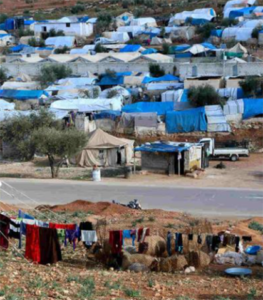Fresh Syrian exodus feared
There are fears of a fresh exodus of hundreds of thousands and perhaps millions of Syrian refugees as the conflict around the last rebel stronghold of Idlib enters what appears to be an endgame.
Already, the UN’s refugee agency UNHCR has expressed concern about the safety of civilians in north-west Syria.
 It says the humanitarian crisis there is becoming increasingly desperate, with massive numbers of people on the move.
It says the humanitarian crisis there is becoming increasingly desperate, with massive numbers of people on the move.
Around 700,000 people have fled within or from the conflict areas in Syria’s Idlib and Aleppo Governorates since early December.
UNHCR says a critical need is shelter, compounded by the harsh winter conditions.
“Many have had to flee already several times, leaving behind possessions, and with limited places for them to stay,” a spokesman said.
“Existing camps and settlements of internally displaced persons are overcrowded, and shelter in existing houses is getting scarce.
“Many schools and mosques are filled with displaced families, and even finding a place in an unfinished building has become close to impossible,” the spokesman said.
UNHCR’s relief efforts appear to be meeting the needs of a small proportion of those who have fled.
Meanwhile, observers say refugees from Syrian President Bashar Assad’s the Russian-backed assault on the region could attempt to get to Europe.
US Secretary of State Mike Pompeo has blamed Russia for exacerbating the problem, because the Russian military is supporting Assad’s latest military offensive rather than bringing the regime to negotiate a political settlement.
“Russia apparently feels that it cannot bring the regime to do the necessary things to bring it in line with the international community’s expectations and needs, so the Russians are going to press forward for a military victory,” James Jeffrey, the State Department’s lead negotiator for the Syria crisis, said recently.
That decision now threatens to swamp the capacities of humanitarian organisations and the Turkish government.
The UN’s emergency coordination body, OCHA, said in a statement that large numbers of people rapidly displaced in the past few months, ongoing fighting, and winter weather have combined to make it extremely difficult to help everyone who needs it.
“This latest emergency compounds an already dire humanitarian situation for people in northwest Syria who have been made vulnerable by years of crisis, violence, economic downturn and multiple displacements,” the statement said.
The past few weeks have seen a dramatic escalation in violence, but fighting and bombing in and around Idlib – which has killed a reported 1700 civilians – has been going on for more than 10 months, since the “buffer zone” that separated rebels from troops loyal to President Bashar al-Assad collapsed.
Turkey, which backs the Syrian opposition and fears a new wave of refugees crossing its southern border, has threatened military action to prevent al-Assad’s forces, which are being assisted by Russian air power, from completing their takeover of the region.
The conflict in Syria has caused the biggest displacement crisis in the world. More than 5.5 million Syrians live as refugees in the region. More than six million Syrians are displaced within the country.












